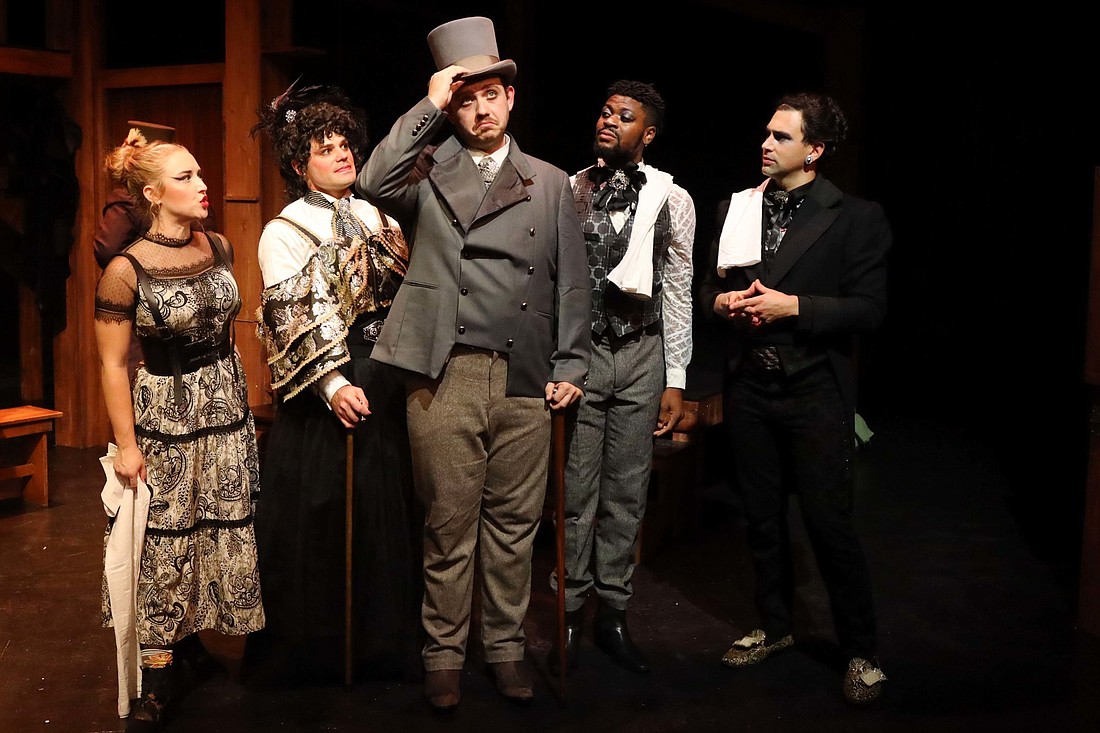- April 26, 2024
-
-
Loading

Loading

Kate Hamill’s stage adaptation of Jane Austen’s “Sense and Sensibility” is the FSU/Asolo Conservatory’s latest production.
Hamill’s play is a comedy; Austen’s novel is not. That double-vision is the comic engine driving the play.
The playwright’s comic strategy assumes you know the source material.
Based on audience reactions, many people did. With the alacrity of a “Rocky Horror” crowd, they reacted to the tale’s twists and quotes in advance. (Hard-core Jane Austen fans, no doubt.) They knew the story cold.
In case you skipped your Jane Austen reading assignment, here’s the gist.
England is the place; 1811 is the time. Mr. and Mrs. Dashwood and their three daughters, Elinor (Rebecca Rose Mims), Marianne (Sharon Pearlman), and Margaret (Brielle Rivera Headrington), live happily on a grand estate in Sussex.
Then Mr. Dashwood abruptly drops dead. Their happiness dies, too.
Thanks to primogeniture, John (Rickey Watson Jr.), the sisters’ henpecked, little half-brother, inherits all. His uncharitable wife (Brooke Turner) tells him to keep it. He says, “Yes dear.” And evicts the family females.
Apart from a miserly stipend, Dashwood’s widow and three daughters lose everything. A family friend provides lodging in a cramped Cornwall cottage. Margaret’s still a kid. But Elinor and Marianne are marriageable.
Snagging a suitable husband (i.e.: “rich”) is their only way out of the cottage. As fortune would have it, the sisters meet two suitable suitors.
Marianne finds the rakish Willoughby (Trezure Coles). Elinor finds the soulful Edward Ferrars (Isayah Phillips). Love blooms! Then, without explanation, the suitors dump the sisters.
Will true love reunite them? Most of you probably know. If not, read the book or see the play.
That may sound like a love story, but it’s not. At least not to the gossipy fops keeping tabs on the Dashwood sisters’ misfortune. In their materialist minds, the fortune’s the real story.
Their chatter about the matrimonial stakes resembles a stock market report ….
Lord X is in for a huge inheritance when his mum croaks. (Uptick!) The Dashwood sisters lose their fortunes. (Massive sell off!)
These nosy upper-class twits are fully aware of the sisters’ lost love—and utterly indifferent. Marry for love? What’s love got to do with it? Sensible ladies marry for money. Sensible gentlemen are equally calculating.
These gossips giggle at the sisters’ story. But they’re on the outside looking in. They’re blind to the story of the heart.
For Elinor and Marianne, that inner story is sad as hell. Hamill tells that story. But her play is still hilarious.
How does she do it? I’ll get back to you on that.
Director James Dean Palmer kicks Hamill’s farce into overdrive. His physical comedy owes a huge directorial debt to Monty Python. Men in drag speak in the shrill “Pepperpot” manner. Other actors simulate horses by banging coconuts together.
Thanks to Palmer’s direction, the audience alternates between belly laughs and sobs. But he’s just being true to the script.
Hamill’s play is more like two plays. One is a ridiculous romp; the other is a weepy tragedy.
They don’t belong together. But they’re stuck in the same theatrical elevator.
The conservatory actors make the most of this schizoid saga. Some play it straight.
Mims’ Elinor is a rational being who keeps her heart on a short leash and her thoughts to herself. Pearlman’s Marianne is a free spirit who follows her heart and speaks her mind. As to their heartthrobs, Phillips’ Ferrars is a nice fella. Coles’ Willoughby is a cad, but still a good lad. Neither meant to hurt the ladies. Both did. They blame wills, inheritances and hormones.
(It’s like society’s fault you know?)
Taking a walk on the silly side, Mrs. Jennings is a relic of the sentimental Georgian age. She feels and gushes and shares.
The 30-somethings of the sensible Regency generation roll their eyes.
(Think aging hippy chatting up stockbrokers in the money-mad ’80s.)
Headrington’s childish Margaret provides periodic comic relief, but doesn’t overplay it. She’d be irritating as a full-on brat.
Hamill’s comedy/tragedy comes to life in Jeffrey Weber’s versatile set. It’s part tree-fort, part M.C. Escher dream, and utterly free of historical realism. Jordan Jeffers' whacky costumes are equally ahistorical. All this madly creative genre-bending, gender-bending, and rule-breaking, adds up to a very funny play. I laughed, but didn’t know why.
And what kind of play is it anyway?
It isn’t a parody of Austen’s novel. Hamill takes the tale seriously, and cares about its characters. But she wraps it up in a fluffy ball of superficial silliness. Why is that funny? And who’s she making fun of?
My best guess? Regency England’s ruling class was mad about keeping up appearances. Vanity, illusion, flash and filigree, outward show, illusion, pose and pretension. As the saints have always said, none of that matters.
In the minds of England’s elite, it was all that mattered. That’s what Hamill’s mocking.
She loves the story. She hates the society. Get it? Without reading Austen’s novels, probably not.
It’d be like watching “Blazing Saddles” if you’d never seen a Western.
Jane Austen super-fans will definitely get the joke. They’ll come to Hamill’s play with granular foreknowledge of the Regency society the story satirizes. They know that society so well, they don’t even have to think about it.
Good thing. Regency society was downright nasty. If you think about it too much, it starts to spoil the fun.
The England of 1811 was a dystopia for 50% of its inhabitants.
Women had no property rights — upper class women included. They were totally dependent upon powerful men for their lives and livelihoods. It was a man’s world and a woman’s nightmare. That’s not funny at all.
But don’t listen to me, gentle reader.
Don’t think. Just laugh and enjoy the play.
That’s the sensible thing to do.